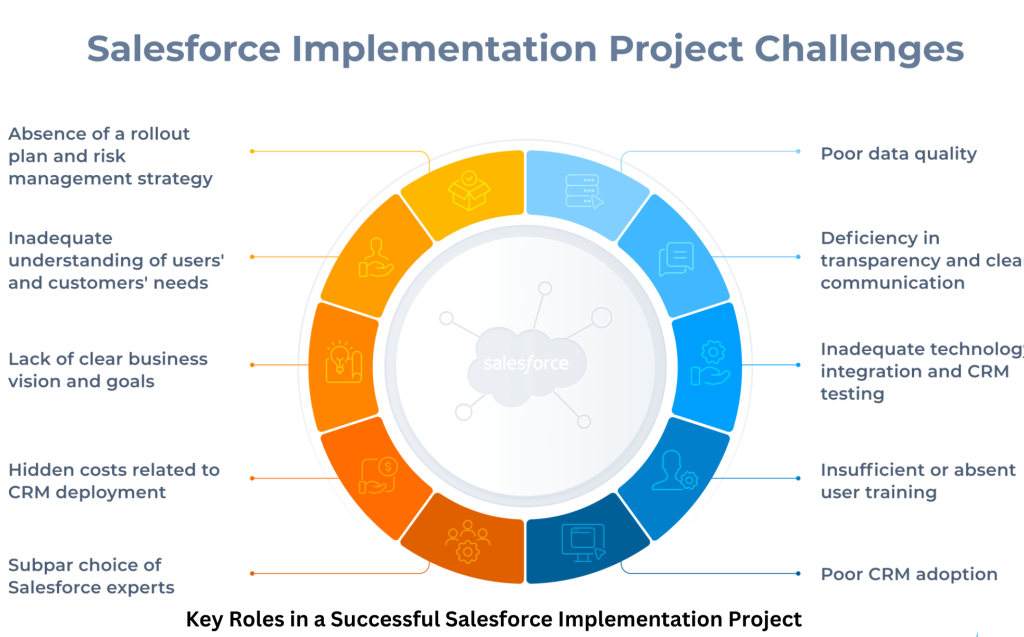Are you ready to take your business to the next level? If so, then you need to know about the role of a Salesforce Implementer. These knowledgeable experts are essential in assisting companies in making the most of their Salesforce platform. From customizing and configuring the system to training and supporting users, a Salesforce Implementer is the key to unlocking the full power of this powerful CRM tool.
But what exactly does a Salesforce Implementer do? In this article, we will delve into the world of Salesforce implementation and explore the many hats that a Salesforce Implementer wears. From analyzing business requirements to designing and implementing solutions, these experts are the backbone of any successful Salesforce implementation. So, if you’re ready to revolutionize your business with Salesforce, keep reading to discover the role of Salesforce Implementer.
Contents
- 1 What is Salesforce?
- 2 Benefits of Using Salesforce Implementation Services
- 3 Key Roles in a Successful Salesforce Implementation Project
- 4 Understanding the Responsibilities of a Salesforce Implementer
- 5 Required Skills and Expertise
- 6 What Is Salesforce? | Why Salesforce? | Salesforce Tutorial For Beginners | Simplilearn
- 7 The Process of Salesforce Implementation
- 8 Best Practices for Successful Salesforce Implementation
- 9 Career Opportunities and Growth Potential
- 10 Frequently Asked Questions
- 10.1 What Is A Salesforce Implementer?
- 10.2 What Are The Key Responsibilities Of A Salesforce Implementer?
- 10.3 What Skills Does A Salesforce Implementer Need?
- 10.4 Why Is Salesforce Implementation Important?
- 10.5 How Long Does A Typical Salesforce Implementation Take?
- 10.6 What Challenges Can Arise During Salesforce Implementation?
- 10.7 Is Salesforce Implementation A One-time Project?
- 11 Conclusion
What is Salesforce?
Customer relationship management (CRM) technology like Salesforce facilitates more efficient customer communication for businesses. Companies can manage leads, accounts, contacts, marketing, and more, thanks to its extensive toolkit. Businesses can use Salesforce to customize their business operations to match the unique needs of their clients. Salesforce empowers companies to automate sales and marketing tasks, measure customer engagement, and gain insights into customer behavior.
The Role of a Salesforce Implementer

A Salesforce Implementer is a skilled professional who plays a vital role in helping businesses maximize the potential of the Salesforce platform. They are responsible for customizing, configuring, and deploying the Salesforce system to meet business needs. Additionally, they provide ongoing support and training to users so they can make the most of their Salesforce experience. Salesforce Implementers typically have a strong understanding of the Salesforce platform and the various tools it offers. They are also well-versed in business processes, analytics, data integration, and more. This allows them to provide strategic guidance on how businesses can best utilize Salesforce to optimize their operations. The role of Salesforce Implementer tasks may include:
• Analysing business requirements and recommending suitable solutions
• Designing and configuring Salesforce processes to meet the needs of customers
• Training users on how to use the system efficiently
• Troubleshooting issues with the platform
• Generating reports for management review
• Optimizing Salesforce configurations as needed
• Working with developers to create custom solutions
• Ensuring compliance with industry and regulatory standards.
The role of Salesforce Implementer is essential for a successful Salesforce implementation, as they ensure that the system is configured correctly, users are trained effectively, and the system is optimized to meet the organization’s specific needs. Without them, companies would not be able to realize the full power of Salesforce.
Benefits of Using Salesforce Implementation Services
Using Salesforce implementation services has many benefits. Firstly, they can help businesses maximize the potential of the Salesforce platform and ensure that it is configured correctly to meet their specific needs. Companies may save time and money by avoiding costly mistakes and ensuring their system is set up properly by utilizing the role of Salesforce Implementer.
Additionally, they provide ongoing support and training to users to help them make the most of their Salesforce experience. By training employees on how to use the system effectively, businesses can ensure that everyone is getting the most out of the platform. Overall, Salesforce Implementers are an invaluable resource for any business looking to maximize their Salesforce investment. They can make sure that your system is configured correctly and operating at its best, thanks to their significant knowledge and experience.

Improved Efficiency
The use of Salesforce implementation services can also help businesses to improve their efficiency. By leveraging the expertise of experienced Salesforce Implementers, companies can streamline their processes and automate tasks that would otherwise require manual work. This helps to reduce time wasted on manual activities, allowing employees to focus on higher-value tasks. Additionally, by ensuring that the system is configured properly, businesses can avoid costly mistakes and errors.
Increased ROI
Using Salesforce implementation services can also help businesses to maximize their return on investment. By leveraging the expertise of experienced Salesforce Implementers, companies can ensure that their system is set up correctly and working at peak efficiency. This helps to ensure that they are getting the most out of their Salesforce investment, resulting in increased ROI.
Increased Productivity
The use of Salesforce implementation services can also help businesses increase their productivity. By leveraging the expertise of experienced Salesforce Implementers, companies can optimize their system to automate manual tasks and processes. This helps to reduce the need for manual activities, freeing up employees to focus on higher-value tasks. Additionally, by ensuring that the system is set up properly, businesses can avoid costly mistakes and errors.
Overall, Salesforce Implementers are an invaluable resource for any business looking to maximize their Salesforce investment. They can make sure that your system is configured correctly and operating at its best, thanks to their significant knowledge and experience. This helps to ensure that businesses are getting the most out of their Salesforce investment, resulting in increased ROI and improved efficiency.
Enhanced User Experience
The use of Salesforce implementation services can also help to enhance the user experience. By leveraging the expertise of experienced Salesforce Implementers, companies can ensure that their system is set up correctly and optimized for their users’ needs. This makes it possible for consumers to swiftly and easily access the capabilities they require, resulting in a more effective workflow. Additionally, by ensuring that employees are trained properly on how to use the system, businesses can ensure that they are getting the most out of their Salesforce experience.
Streamlined Business Processes and Workflows
Using Salesforce implementation services can help businesses to streamline their business processes and workflows. By leveraging the expertise of experienced Salesforce Implementers, companies can ensure that their system is optimized for their specific needs. This helps to reduce time wasted on manual activities, allowing employees to focus on higher-value tasks. Additionally, by ensuring that the system is set up properly, businesses can automate certain tasks, resulting in improved efficiency and productivity.
Key Roles in a Successful Salesforce Implementation Project
A successful Salesforce implementation project requires the involvement of various key roles. These include a Project Manager, Salesforce Administrator, Business Analyst, Developer, and Tester. Each of these responsibilities is in charge of various areas of the project and is crucial to ensuring that it achieves its aims and objectives.

All project-related activities, such as planning, budgeting, scheduling, and tracking, must be coordinated by the project manager. The Salesforce Administrator is responsible for managing the system configuration and ensuring that the system meets the business needs. The Business Analyst is responsible for analyzing user requirements and developing functional specifications. The system’s design, coding, and testing are under the purview of the Developer. Finally, the Tester is responsible for ensuring that all components of the system have been tested before going live.
Project Manager
In order for a Salesforce implementation project to be successful, the project manager is essential. They are in charge of organizing every part of the project, including planning the budget, creating a schedule, monitoring the progress, and guaranteeing that tasks are finished on time. The Project Manager must be proficient in both Salesforce and project management processes in order to effectively manage the project. They must also guarantee that everyone involved in the project is aware of their particular responsibilities and tasks.
Implementation Team
An implementation team is an essential part of any successful Salesforce implementation project. From planning and budgeting to testing and deployment, this team is in charge of overseeing the entire project. The team is typically comprised of a Project Manager, Business Analyst, Developer, and Tester. These responsibilities are crucial in ensuring that the project achieves its aims and objectives because they are in charge of various areas of it.
Development Team
The Development Team is an essential part of any successful Salesforce implementation project. This team is responsible for designing, coding, and testing the system to ensure that it meets the business needs. A project manager, a business analyst, a developer, and a tester normally make up the team. The Developer is responsible for understanding the user requirements and developing solutions using Salesforce tools. Additionally, they must be proficient in coding and design technologies such as Apex, Visualforce, and Lightning.
Power Users
Power Users are users within an organization who have elevated access to the Salesforce system. Power Users have advanced permissions, such as being able to create custom objects and fields, modify page layouts, and manage record types and profiles. They also have the ability to customize reports and dashboards. The role of a Power User is critical in ensuring that the system is optimized for the specific needs of an organization.
Consultants and Partners
Consultants and Partners play a vital role in any successful Salesforce implementation project. These professionals have the technical expertise and experience to help guide the project team through every step of the process, from planning and budgeting to deployment and going live. They also provide valuable insights into best practices for using Salesforce and can offer guidance on system optimization. Additionally, they are able to provide training and support to end users.
Understanding the Responsibilities of a Salesforce Implementer

A Salesforce Implementer is a skilled professional who is responsible for helping businesses maximize the potential of their Salesforce platform. The role of an implementer is multi-faceted and involves analyzing business requirements, customizing the system, training users, and providing technical support.
One of the key responsibilities of a Salesforce Implementer is to analyze the business process and requirements of a customer and identify how Salesforce can be used to solve their needs. The implementer must also create detailed configuration documents, which outline the customizations needed in order for Salesforce to meet those requirements. They must then configure the system according to the document specifications and ensure that it meets all stakeholders’ needs.
Once the system is configured, the Salesforce Implementer must then provide training to end-users and ensure that they understand how to use the platform. They must also be available for technical support on an ongoing basis and be able to troubleshoot any issues that may arise. Finally, the implementer must effectively communicate with stakeholders throughout the entire process and manage their expectations.
Required Skills and Expertise
To be successful in the role of a Salesforce Implementer, it is essential that they possess a number of technical skills and knowledge. This includes an in-depth understanding of the Salesforce platform, including tools such as Data Migration Wizard, Force.com IDE, and Cloud Connector. They must also be familiar with the integration of third-party applications to Salesforce and have a working knowledge of API protocols like RESTful.
A Salesforce Implementer must have strong technical abilities in addition to problem-solving, critical thinking, and attention to detail. They must understand the importance of creating detailed system documentation and be able to communicate effectively with stakeholders throughout the implementation process. Additionally, they must be able to troubleshoot any problems that may develop and offer solutions quickly.
What Is Salesforce? | Why Salesforce? | Salesforce Tutorial For Beginners | Simplilearn
The Process of Salesforce Implementation
Salesforce implementation is a multi-step process that involves planning, configuration, customization, and testing. A Salesforce Implementer plays a key role in each phase of the process and works with stakeholders from various departments, such as sales, marketing, and IT, to ensure successful implementation.
The first step in the process is planning. During this stage, the Salesforce Implementer works with stakeholders to define business requirements and create a plan for implementation. This includes creating detailed system documentation outlining the customizations needed for the system to meet those requirements. The next step is configuration, which involves setting up the Salesforce platform according to the document specifications. The Salesforce Implementer must ensure that all components of the system are in place and working correctly.
The third step is customization, which involves making adjustments and changes to the system in order to meet all stakeholders’ needs. This can include customizing objects, fields, page layouts, and user profiles. The Salesforce Implementer must be knowledgeable of the various tools available in Salesforce and be able to use them effectively. Finally, the last step is testing. During this stage, the Salesforce Implementer must test the system to ensure that it meets all requirements and is functioning correctly. Once testing is complete, the system is ready for deployment.
Read Another post: Can A Salesforce Form Assembly Help To Drive Quality From Conversions?
Best Practices for Successful Salesforce Implementation
In order to ensure a successful Salesforce implementation, it is important to follow some best practices. Firstly, involving end-users in the process is key to gaining their trust and ensuring that the system will meet their needs. End-users should be consulted throughout the entire implementation process in order to understand their requirements and create a plan that meets them.
Secondly, it is essential to set realistic goals and timelines for the implementation. It is important to allow enough time for testing and deployment in order to ensure the system meets all requirements. It is also important to be flexible and willing to make changes as needed during the process.
Thirdly, providing ongoing training and support is critical for a successful Salesforce implementation. End-users should be given the necessary resources to learn how to use the system and should be provided with ongoing support in order to ensure their continued success.
Finally, it is important to document processes and continuously improve your Salesforce solution. In order to make sure that the system is operating properly and that end users are getting the most out of it, it is crucial to keep track of changes, updates, and modifications. It is also important to review the system regularly and make adjustments as needed in order to keep the system up-to-date and meet business needs.

Career Opportunities and Growth Potential
The Salesforce Implementer role provides many career opportunities and growth potential. Salesforce implementers may choose to become a Salesforce consultant or administrator, providing support and advice to organizations on all aspects of the platform. This role requires strong technical knowledge and problem-solving skills, as well as the ability to communicate effectively with stakeholders from various departments within an organization.
Salesforce implementers have the option to specialize in other components of the platform, such as Sales Cloud, Service Cloud, or Marketing Cloud, in addition to serving as consultants or administrators. They may also become certified in specific areas of Salesforce and become experts in that particular field.
Salesforce implementers have the potential to advance their careers by becoming product architects or specialists. These roles involve overseeing entire implementations from start to finish and providing expert advice on system optimizations. Salesforce implementers may also become Salesforce trainers, teaching new users how to use the platform and helping them maximize its potential. Overall, a career as a Salesforce implementer provides many opportunities for growth and advancement. With the right skills and expertise, an individual can enjoy a successful career in the Salesforce ecosystem.
In order to stay ahead of the competition and ensure success, it is important for Salesforce implementers to stay up-to-date with the latest developments in the Salesforce ecosystem. This may involve attending conferences, webinars, and other events to learn about new features and best practices. Additionally, certifications can help demonstrate an individual’s knowledge and expertise in the platform.
Frequently Asked Questions
What Is A Salesforce Implementer?
A Salesforce Implementer is a professional who specializes in configuring and customizing Salesforce to meet the specific needs of a business. They work closely with clients to understand their requirements and design solutions that maximize the benefits of the Salesforce platform.
What Are The Key Responsibilities Of A Salesforce Implementer?
The responsibilities of a Salesforce Implementer include requirements gathering, system design, data migration, customization, integration with other tools, user training, and ongoing support and maintenance. They ensure that Salesforce aligns with the organization’s goals and processes.
What Skills Does A Salesforce Implementer Need?
A Salesforce Implementer should have a strong understanding of CRM concepts, Salesforce features, and database management. They should also possess excellent problem-solving, communication, and project management skills. Additionally, they need to be proficient in Salesforce-specific languages like Apex and Lightning components.
Why Is Salesforce Implementation Important?
Implementing Salesforce effectively can lead to improved customer relationships, increased sales, streamlined processes, and better data management. It enables businesses to harness the full potential of Salesforce and gain a competitive edge.
How Long Does A Typical Salesforce Implementation Take?
The duration of a Salesforce implementation varies depending on the complexity of the project and the organization’s requirements. It can range from a few weeks for a basic implementation to several months for a more complex one.
What Challenges Can Arise During Salesforce Implementation?
Common challenges include data quality issues, resistance from users, scope creep, and integration problems with existing systems. A skilled Salesforce Implementer anticipates and addresses these challenges to ensure a smooth implementation.
Is Salesforce Implementation A One-time Project?
While the initial implementation is a project, Salesforce is an evolving platform. As business needs change, updates and enhancements to Salesforce are often necessary. A Salesforce Implementer can provide ongoing support and make adjustments as required.
Conclusion
So, what are you waiting for? Suppose you want to expand your business growth. In that case, it is the right time to hire professional consultants who offer Salesforce financial cloud services and Salesforce marketing cloud pricing without breaking your bank accounts. Empire Cloud is the best and most prominent company that helps you achieve top-quality results with on-time delivery, which is always a good and better option for any system.





